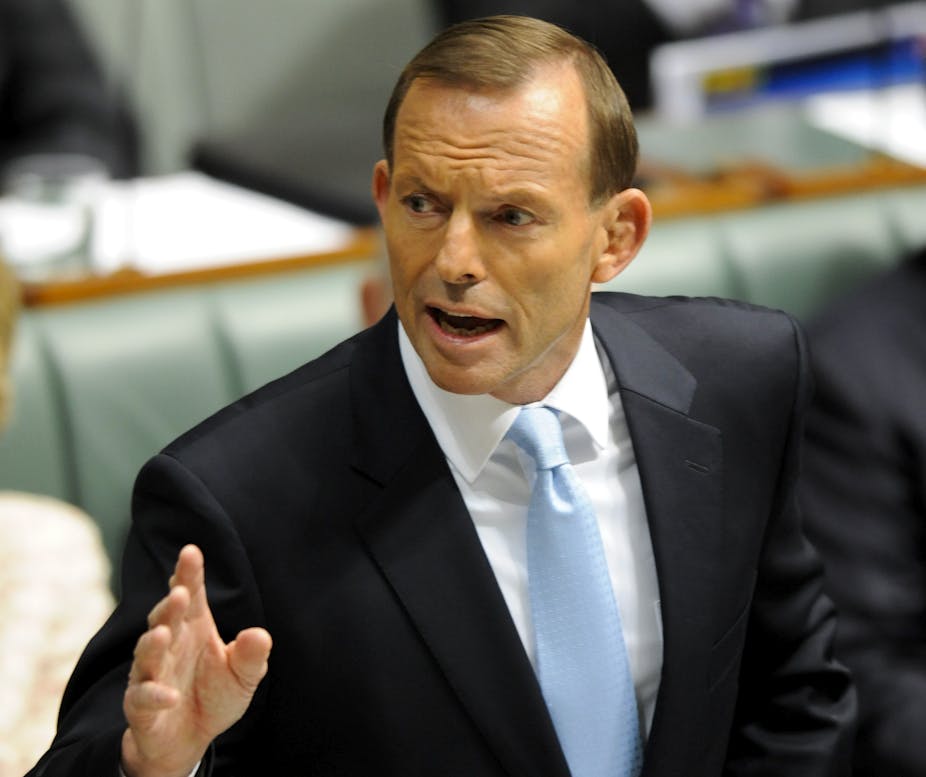As the dust from the allegations of sexism settles over the parliament, it’s time to clarify, once and for all, Tony Abbott’s actions on abortion.
In his recent Quarterly Essay and in numerous interviews, David Marr has painted an influential picture of Tony Abbott as a man divided between his values and his politics.
Abortion is a case in point and Marr assures us that “Abbott the politician knows he can’t roll back the law on abortion”. Marr claims that as health minister, Abbott did nothing more substantive about abortion than revive a long-settled abortion debate.
So persuasive is this analysis that Christopher Pyne repeated it recently on ABC TV’s Q&A, stating, “Abbott has made it so clear that even David Marr had to write about it in his essay that Tony Abbott has said he has no intention of going anywhere near the abortion laws in Australia which, by the way, are state-based laws anyway and he’s running for prime minister of Australia, not premier of a state.”
Pyne is correct that abortion governance is mostly a matter for the states. But abortion is most vulnerable in the arena of Medicare, which is susceptible to the whims of federal politicians. Pyne understands this.
Julie Bishop echoed Pyne on the 7:30 Report, saying, “I don’t believe that Tony Abbott’s views on abortion are sexist. He has a different view on abortion than I do, but when he was the health minister, at no time did he seek to change the laws in relation to abortion in this country.”
But in 2005, Abbott and Pyne attempted a restructure of Medicare that constituted the greatest threat to abortion funding since the 1970s. Marr has evidently overlooked this episode.
To be clear, Marr is correct that from 2004 to 2006, when he was health minister, Abbott drove a national abortion debate in parliament and beyond. This culminated in his humiliation by the parliament when it voted to remove his ministerial control over the abortion drug RU486.
It seems attention given to RU486 and Marr’s appraisal of Abbott has overshadowed the efforts of Abbott and Pyne on Medicare. And it’s ominous that Gillard didn’t recall the assault on Medicare in the list of Abbott’s offences she recently catalogued in parliament.
In late 2004, John Howard had the political sense to shut down the parliamentary abortion debate. Then-shadow health spokesperson Gillard asked Abbott if he could guarantee not to use “his ministerial office or departmental resources to advance views inconsistent with the government’s policy [on abortion] as announced by the prime minister.”
Abbott replied that he was “very happy to tell the House that the government’s policy has been splendidly articulated by the prime minister.” So, it was his then-parliamentary secretary Pyne who introduced the Health Legislation Amendment Bill to parliament in 2005.
The bill was presented as a measure to amend the Pharmaceutical Benefits Scheme, but Schedule 3, amending the Health Insurance Act 1973, aimed to “clarify the scope and power to make Medicare tables.” In effect, the bill would have granted Abbott as health minister extraordinary power to “determine that Medicare benefits are not payable in specific circumstances”, including for items “the government does not wish to fund through Medicare”.
The bill was immediately sent to committee where Schedule 3 was interpreted by politicians and health professionals alike as an attack on abortion, and perhaps IVF. As with the pro-RU486 legislation, women MPs worked together to condemn the “disconcerting and questionable” Medicare provision.
Labor’s Claire Moore, the Democrats’ Lyn Allison and others claimed that given his public statements about abortion and IVF, “no-one trusted” Abbott with power over the Medical Benefits Schedule. Within a month, Abbott backed down and announced he had dropped Schedule 3 from the bill.
Abortion procedures have been included in the Medical Benefits Schedule since its inception in 1974. Following the lead of American anti-abortionists who undermined federal funding in the United States, a motion was put to the Australian parliament in 1979 to restrict the payment of medical benefits for termination of pregnancy.
The Country Party sponsor of the motion, Stephen Lusher, compared most abortions to cosmetic surgery. In 1979, there were no female members of the House of Representatives so it was left to men to defeat Lusher’s motion. They did so by a margin of 65 to 47.
From 1980 to 2005, no major party challenged abortion funding in the parliament, reflecting bipartisan consensus on the matter. Abbott and Pyne broke that consensus to find their efforts sabotaged by women MPs already angered by provocation of an abortion debate.
Then, in 2008, emboldened by the new post-consensus era, Liberal senator Guy Barnett attempted to restrict Medicare for abortions after 14 weeks. He failed in committee before losing his seat.
The partial Medicare rebate is vital to women’s access to abortion procedures, which in New South Wales, for instance, can involve out-of-pocket expenses ranging from between $300 and $1,500. Recently, Women’s Health NSW, the peak body for women’s health groups in the state, documented the unaffordability of abortion, even with Medicare.
The out-of-pocket cost for terminations particularly impacts women who are unwaged or receiving Centrelink benefits. Any restrictions on Medicare would be disproportionately and keenly felt by these women.
Clearly, any questions about aspiring prime minister Tony Abbott’s abortion track record, or his intentions, must address Medicare first and foremost.

